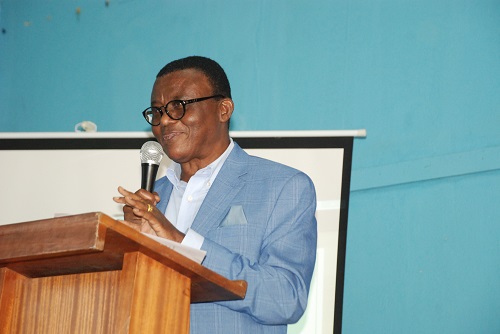Professor Baffour Agyeman-Duah, Co-Founder of the Centre for Ghana Democratic Development (CDD-Ghana), has suggested that the traditional authorities should be given roles in the practice of modern democratic governance.
According to him, this practice worked for the colonialists, and he did not see any reason why it would not work in modern times.
Giving a public address on the 18th Annual Konti ne Akwamu Democracy and Good Governance Lecture in Accra on last week Thursday, he said in practice democracy should be localised.
The public lecture was held under the theme: “In conversation with CDD-Ghana: 25 years of promoting democracy, good governance, and inclusive development.”
“Prior to colonisation and the introduction of the western system of government, chiefs ruled, and during the era of colonisation, they were pivotal in indirect rule. Above all, they owned the land that we all sit on,” he stated.
He said the chiefs’ role in modern democracy was becoming more critical with each passing day and night due to the continued erosion of democracy in the country and Africa as a whole.
Prof. Agyeman-Duah added that political scientists and analysts in mature democracies have all expressed fears and concerns over the rapid decline in popular support for democracy around the globe.
Meanwhile, democracy is the respect and protection of human dignity and liberties on one side and practical democracy—institutions and systems (government)—on the other.
He acknowledged that major challenges to democracy have been blamed on failing instructions and systems.
“This refers to how, through institutions and systems, the politics of society actualize the tenets of principles and how, through human agencies, they become functional to be meaningful and effective,” he explained.
The CDD-Ghana co-founder further argued that it would be meaningful for institutions and systems to reflect society’s history, culture, traditions, and other environmental factors.
It was his fervent belief that more often than not, local content requires society to address fundamental issues or the practical questions of nationhood prior to creating the structure and systems of governance.
He pinned his argument on whether Ghana prioritised these practical issues before the drafting of the 1992 Constitution that created the Fourth Republic.
Hitherto, he said, “Practice democracy requires adaptation of institutions and systems to local realities. It should depend to a large extent on the peculiar circumstances of the politics. It should be localised.”
Prof. Agyeman-Duah added that overlooking such issues in the future of the new nation could be rocky and even create a crisis.
He pointed out that the emergence of military coups against democratically elected leaders in recent times has heightened concerns over failing democracy.
Making reference to year-on-year afrobarometer surveys, he said that the enthusiasm with which people welcomed the rebirth of democracy in 1993 and the euphoria in the successive change of government through the ballot box in 2000 have all dissipated.
He reiterated that the activity and relevance of institutions and the capacity of human agencies are important underlying factors of working democracy.
On the role of CDD over the past two and a half decades, he said the civil society organisation has led a tremendous change in the country’s democratic process.
He said the Centre led the conversation on military-civilian relations and the importance of the constitution and civilian rule.
Prof. Agyeman-Duah added that the Centre was established based on the influence of the political environment of the early 1990s.










